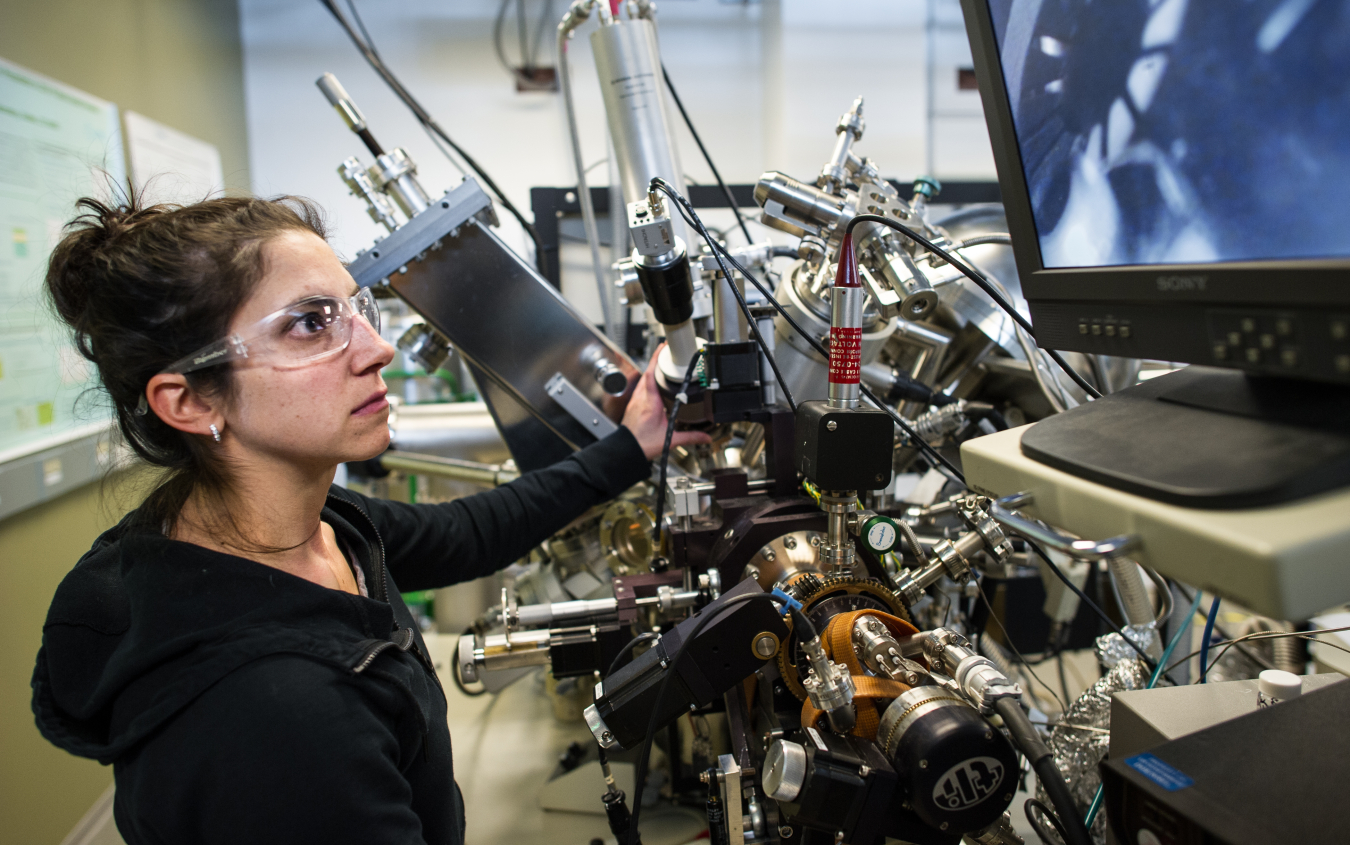Learn why Dr. Eliza M. Miller-Link loves her job as a research scientist at the National Renewable Energy Laboratory.
December 16, 2019
Elisa M. Miller-Link is a research scientist at the National Renewable Energy Laboratory (NREL). She started at NREL as a postdoctoral researcher in 2013 and was hired as a research scientist in 2016. In her time at NREL, she has been driving her own research projects by studying the fundamental properties of quantum-confined materials for various applications, such as solar panels and solar fuels. Prior to her time at NREL, she received a Ph.D. in chemistry from the University of Colorado Boulder in 2012. Her B.A. and undergraduate research in chemistry from Boston University in 2005 prepared her for a career in energy.
What inspired you to work in STEM?
Growing up, I was not the standout student, but was more interested in sports and playing with my friends. It was not until high school that I really started to develop an interest in my studies, specifically STEM subjects. I was very fortunate to have dedicated STEM teachers that went above and beyond to get us excited about the physical sciences, which included a biology trip to Florida Keys, dissecting animals in biology, creative physics experiments, and environmental labs that made us go outside and test different water sources. These experiences and interactions with my high school teachers really showed me how curious I was about science and that I liked to use my hands to solve the problems!
What excites you about your work at the Energy Department?
I’m passionate about positively contributing to our world’s energy and resource challenges, where the nanomaterials that I study can be a potential solution. I’m excited that my research focuses on understanding how the fundamental properties of nanomaterials can be controlled and tuned, which will eventually lead to useful nanomaterials in solar cells or solar fuels, such as hydrogen or ammonia gas. Moreover, I work with a great team at NREL where we have a common mission and goal to improve our country and our world. The research at NREL spans from fundamental studies to deployed technology, and it is fascinating to be at a lab that can successfully contribute across the spectrum. I find great satisfaction in knowing that my fundamental studies of how nanomaterials interact with their surroundings is essential to making efficient devices, which can be realized at NREL. Being surrounded by such a smart and innovative team is both inspirational and motivational for my research and career goals.
How can our country engage more women, girls, and other underrepresented groups in STEM?
Our country can do a lot for underrepresented groups in STEM by making all feel welcome, safe, and appreciated. I strongly believe that our society has unconscious bias in every professional discipline. This unconscious bias needs to be recognized by all and improved upon. For example, by mentoring those interested in the STEM field, we get to learn about an individual’s needs and how best to motivate and be a champion for them. Also, as a society, we need to make sure that internships, research opportunities, promotions, awards, teaming, etc. include underrepresented groups from the beginning and that unconscious bias does not influence decision-making. This will strengthen our STEM pipeline! We need to continue to recruit and excite underrepresented groups for STEM by interacting with K-12 students and providing internships. If people feel welcome, safe, and appreciated, they will optimally perform and feel empowered to progress in their educational training and career.
Do you have tips you'd recommend for someone looking to enter your field of work?
I have two main suggestions for those interested in working in STEM and specifically in my field: surround yourself by positive mentors and champions and get involved with research as soon as possible.
I am so thankful for those that have always encouraged and pushed me throughout my career. In addition to having a great network outside of science, I have been very fortunate to have supportive teachers, research advisers, mentors, and managers throughout my research career. Some of this is by chance and some is by not dwelling on negative people. There will always be negative people that do not support you; however, there will also be positive, inspirational people too. Find those people; they are out there!
For me, I was sold on chemistry once I was able to do the research. It motivated me to learn more in my classes and stay focused, since I knew why I was there. Research is not for everyone and it is better to know sooner rather than later. If research is for you, then getting as much experience is the best thing that you can do. Make sure to pick research projects and groups that push you to learn more and not just stay in your comfort zone. You can’t develop in your career without pushing your intellectual boundaries.
When you have free time, what are your hobbies?
I think that part of being successful is feeling balanced and centered. For me, it’s critical that I am social outside of work and spend time with my husband, family, and friends. These people are so important to me and are a great reminder that I must be true to myself and them. This keeps me passionate about my career. Right now, I really like to work in my garden, where we grow veggies and flowers. I also enjoy baking sourdough bread and trying other fun recipes in the kitchen. One thing that has really helped me to stay balanced is working out. I like lifting weights, doing HIIT, and crushing Crossfit workouts! Also, riding bikes with my husband through the neighborhood is a great after-dinner activity.
Learn more about our programs & resources for women and girls in STEM at /women

